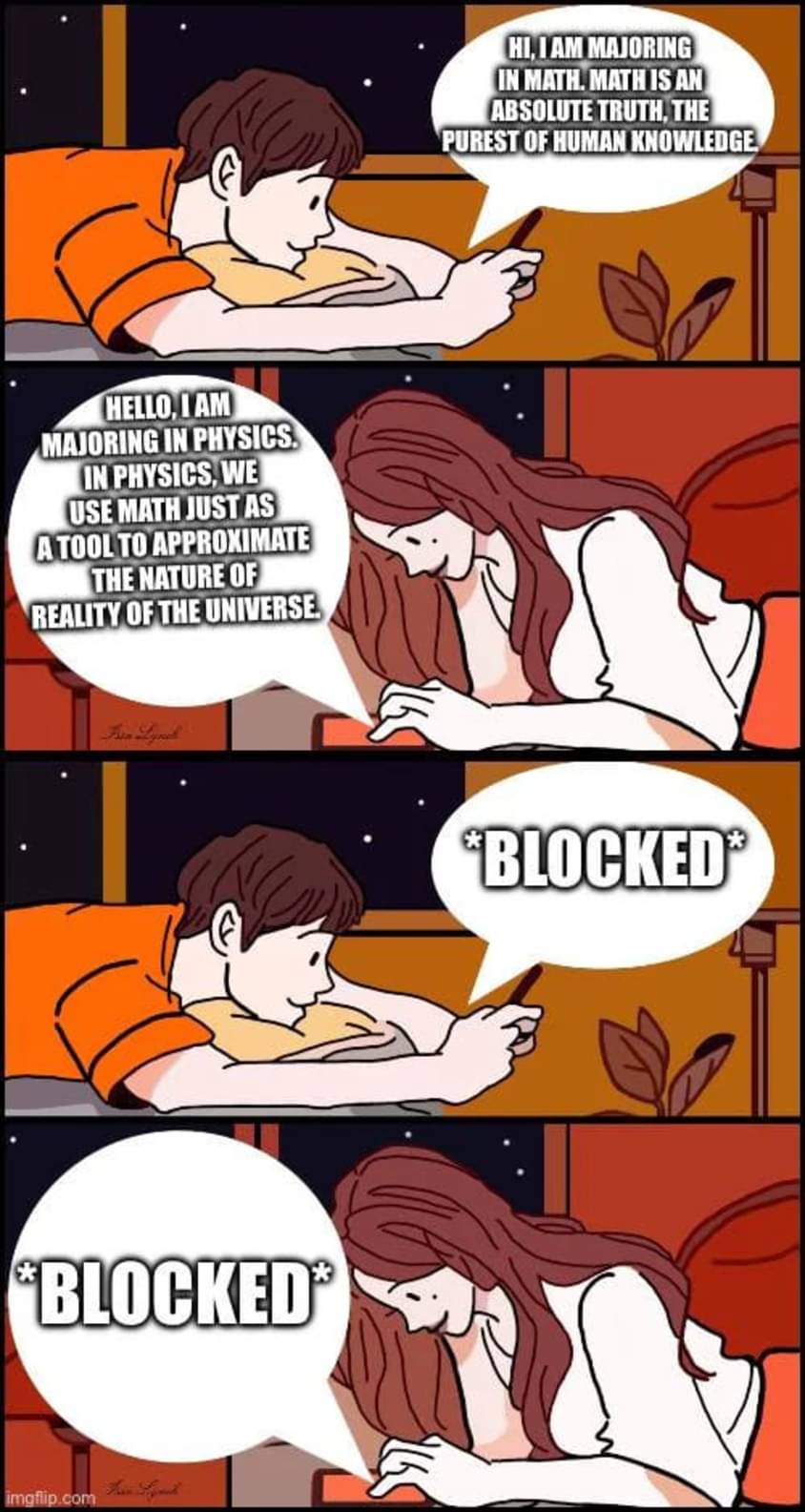this post was submitted on 27 Aug 2024
681 points (97.0% liked)
Science Memes
10575 readers
3013 users here now
Welcome to c/science_memes @ Mander.xyz!
A place for majestic STEMLORD peacocking, as well as memes about the realities of working in a lab.

Rules
- Don't throw mud. Behave like an intellectual and remember the human.
- Keep it rooted (on topic).
- No spam.
- Infographics welcome, get schooled.
Research Committee
Other Mander Communities
Science and Research
Biology and Life Sciences
- [email protected]
- [email protected]
- [email protected]
- [email protected]
- [email protected]
- [email protected]
- [email protected]
- [email protected]
- [email protected]
- [email protected]
- [email protected]
- [email protected]
- [email protected]
- [email protected]
- [email protected]
- [email protected]
- [email protected]
- [email protected]
- [email protected]
- [email protected]
- [email protected]
- [email protected]
- [email protected]
- [email protected]
- !reptiles and [email protected]
Physical Sciences
- [email protected]
- [email protected]
- [email protected]
- [email protected]
- [email protected]
- [email protected]
- [email protected]
- [email protected]
- [email protected]
Humanities and Social Sciences
Practical and Applied Sciences
- !exercise-and [email protected]
- [email protected]
- !self [email protected]
- [email protected]
- [email protected]
- [email protected]
Memes
Miscellaneous
founded 2 years ago
MODERATORS
you are viewing a single comment's thread
view the rest of the comments
view the rest of the comments

Calling a made up construct "the absolute truth" is hilarious
The way I see it, axioms and notation are made up but everything that follows is absolute truth
Axioms can be demonstrated. They don't have to be purely theoretical.
Mass and Energy are axiomatic to the study of physics, for instance. The periodic table is axiomatic to understanding chemistry. You can establish something as self-evident that's also demonstrably true.
One could argue that mathematics is less a physical thing than a language to describe a thing. But once you have that shared language, you can factually guarantee certain fundamental ideas. The idea of an empty set is demonstrable, for instance. You can even demonstrate the idea of infinity, assuming you're not existing in a closed system.
You can posit axioms that don't fit reality, too. And you can build up features of this hypothetical space that diverge from our own. But then you can demonstrate why those axioms can't apply to this space and agree as such with whomever you're trying to convey ideas.
When we talk about "absolute truth", we're talking about a point of universal rational consensus. Mathematics is a language that helps us extend subjective observation into objective conclusion. That's what makes it a useful tool in scientific inquiry.
The test to know if anything is an absolute truth is if it is called an absolute truth. If it is called an absolute truth, then it isn't an absolute truth. If it isn't called an absolute truth, then it isn't an absolute truth. Absolute truths don't exist. If someone tells you something is an absolute truth, stop listening to them.
You could say it's an absolute truth that absolute truths do not exist.
What about my Sith friend?
They're made up constructs that reflect the absolute truth when applied correctly (from his perspective).
Well, it depends on your definition of truth and it could be the absolute truth by definition. A theorem is absolutely true in the same way that "a bachelor is an unmarried man" is categorically true.
"This line on the map is perpendicular to this other line on the map" is not a statement about the territory.
Math ain't made up. Math is discovered.
I don't think that's a settled debate IIRC
I was about to say "incompleteness theorem"!
That just means we can't know everything about the system. Not that it is not true.
That's computer science alongside with Church/Turing. Maths could have tried to claim it but they doubled down on formalism so they don't deserve it.
That said though incompleteness follows from nothing but logical implication itself so it's more fundamental than physics (try to imagine a physics without cause and effect that doesn't get you cancelled because Boltzmann) and philosophy (find me a philosopher who wasn't asleep during their logic lectures).
Yeah, I meant to say that the incompleteness theorem proves that math cannot be perfectly pure and fundamental. I don't exactly care which field claims it, because I don't like to encourage artificial boundaries between disciplines. It's nice to use information theory results in physics :)
The other way around: As long as you accept that cause and effect are a thing, you must accept that there are things that are, fundamentally, uncomputable. And as our universe very much does seem to have cause and effect that's a physical law, likewise is complexity theory. Differently put: God can't sort a list with fewer than O(n log n) comparisons.